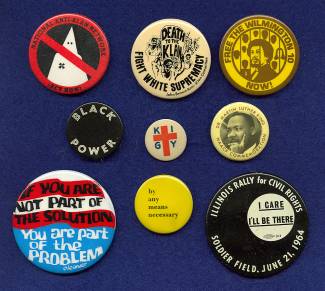Collection Name
About
The National Anti-Klan Network was established in 1979 in Atlanta, Georgia. It was the result of the coming together of several civil rights groups that felt the need to monitor, prosecute, and publicize the increasing illegal activities and violence being undertaken at that time by the Ku Klux Klan (KKK). The Network later changed its name to the Center for Democratic Renewal (CDR) and remains a very active civil rights organization combating racism and bigotry.
The phrase, "If you are not part of the solution, you are part of the problem" was used by Black Panther Eldridge Cleaver, during a 1968 speech in San Francisco, California.
The quote by Malcolm X, "by any means necessary", was made in 1964 and refers to the belief that blacks must be uncompromising in their efforts and are fully in their rights toward bringing about "complete freedom, justice, and equality by any means necessary."
In June 1966, James Meredith, the first black to attend "Ole Miss/ University of Mississippi" in 1962, was shot and wounded while participating in a protest march from Memphis, Tennessee to Jackson, Mississippi. Civil Rights leaders from around the country came to Mississippi to finish the march for Meredith. These included Martin Luther King of the Southern Christian Leadership Council and Stokely Carmichael, who was at that time Chairman of SNCC.
The march embodied the differences between those who believed in non-violence, and the younger leaders who leaned toward a Black Nationalist and confrontational approach. Carmichael was arrested at a rally during the march. Upon his release Carmichael used the phrase, "Black Power" in his remarks. Though the term had already been in existence, and the phrase "Black Power" was then and remains open to interpretation, it was this event which popularized its usage. Stokely Carmichael later took the name, "Kwame Ture" and moved to Guinea.
Benjamin Chavis (1948- ) was a civil rights activist from Oxford, North Carolina who had been asked to come to Wilmington, North Carolina in early February 1971 to help organize black students in a protest and boycott against racial discrimination in the public school system.
Violence broke out during the days that followed which resulted in several fire-bombings and two deaths. Chavis and nine others were arrested, found guilty of arson and conspiring to shoot police and firemen, and sent to prison. The case of the Wilmington Ten garnered national publicity and their case was taken up by many groups who felt the evidence against them was fabricated. However, the charges stuck and it would not be until 1981 that the convictions were overturned by a Federal Appeals Court (Chavis had actually been paroled a year earlier). In January 2013 the Wilmington 10 officially received a Pardon of Innocence from North Carolina Governor Beverly Purdue.
Chavis went on to serve as the President of the NAACP for almost two years in the mid-1990s (it was a controversial tenure), was an organizer of the "Million Man March" in 1995, and in 1997 joined the Nation of Islam and became known as Benjamin Chavis Muhammad.
On June 21, 1964, over 90,000 people attended the Illinois Rally for Civil Rights. This was held at Soldier Field in Chicago. Dr. Martin Luther King Jr. was the speaker and this was among the early efforts to bring his movement north from the south. Marches and parades accompanied the rally, primarily focusing upon jobs and equal housing.
The Ku Klux Klan (KKK) was originally founded in 1866 by ex-Confederates who opposed Reconstruction and hoped to maintain "White Supremacy" in the South. It has undergone several rebirths since then, and in the early 1900s also became known for its anti-Semitic and anti-Catholic beliefs. The KKK reached its zenith in the mid-1920s when its national membership was estimated at about four million. By the 1930s it had nearly evaporated, although some pockets of Klan activity remained strong. The Civil Rights movement of the 1960s helped breath new life into the Klan in the South. With a membership now estimated at over 5,000, it has reemerged again somewhat over such issues as immigration. The "KIGY" button is from the 1920s era and stands for, "Klansman I Greet You." This was a recognized greeting among Klan members.
The John Brown Anti-Klan Committee was very active in the late 1970s and 1980s. It is considered to be a white anti-racist organization, somewhat militant, and Communist in origin. Its primary focus is to oppose the Ku Klux Klan and other racist groups, but also supports other various "liberation" struggles.
Buttons from the collection of Albert and Angela Feldstein
Text from over forty years of notes, newspaper and magazine clippings, flyers, and other sources associated with the collecting of buttons and used in the research of the 2003 political history poster entitled, "Buttons of the Cause, 1960-2003: The Events, The People, The Organizations, The Issues".
